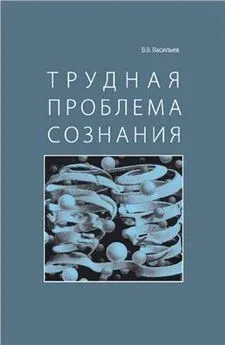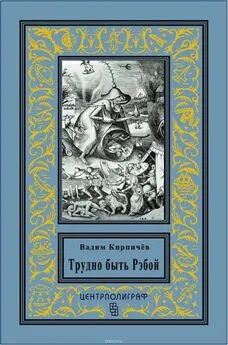Вадим Васильев - Трудная проблема сознания
- Название:Трудная проблема сознания
- Автор:
- Жанр:
- Издательство:Прогресс-Традиция
- Год:2009
- Город:Москва
- ISBN:978-5-89826-316-0
- Рейтинг:
- Избранное:Добавить в избранное
-
Отзывы:
-
Ваша оценка:
Вадим Васильев - Трудная проблема сознания краткое содержание
Книга посвящена обсуждению "трудной проблемы сознания" — вопроса о том, почему функционирование человеческого мозга сопровождается субъективным опытом. Рассматриваются истоки этой проблемы, впервые в четком виде сформулированной австралийским философом Д.Чалмерсом в начале 90-х гг. XX века. Анализируется ее отношение к проблеме сознание — тело и проблеме ментальной каузальности. На материале сочинений Дж. Серла, Д.Деннета, Д.Чалмерса и многих других аналитических философов критически оцениваются различные подходы к загадке сознания. В заключительной части книги автор предлагает собственное видение "трудной проблемы", позволяющее, с его точки зрения, избежать концептуальных тупиков и отдать должное интуициям здравого смысла
Трудная проблема сознания - читать онлайн бесплатно полную версию (весь текст целиком)
Интервал:
Закладка:
Place U. T. Identity theories. TS 1999.
Place U. T. Identifying the Mind: Selected Papers of U. T. Place. N. Y., 2004. Polger T. Rethinking the evolution of consciousness // The Blackwell Companion to Consciousness, ed. by M, Velmans and S- Schneider. Maiden, 2007. P. 72–86.
Popper K., Eccles J. The Self and Its Brain: An Agrument for Interactionism. В., 1977.
Pratt J. B. The present status of the mind‑body problem // The Philosophical Review 45: 2 (1936). P. 144–166.
Preston A. Prolegomena to any future history of analytic philosophy // Metaphilosophy 35: 4 (2004).
Preston J., Bishop M. (eds) Views into the Chinese Room: New Essays on Searle and Artificial Intelligence. N. Y., 2002.
Priestley J. Disquisitions relating to Matter and Spirit. L., 1777.
Prinz J- The intermediate level theory of consciousness // The Blackwell Companion to Consciousness, ed. by M. Velmans and S. Schneider. Maiden, 2007. P. 247–260.
Putnam H. Minds and machines // Dimensions of Mind, ed. by S. Hook. N. Y., 1960. P. 148–180.
Putnam H. Psychological predicates // Art, Mind, and Religion, ed. by W. Capitan and D. Merrill. Pittsburgh, 1967. P. 37–48.
Putnam H. Words & Life. Cambridge MA, 1994.
Quine W. V. The Ways of Paradox. N. Y, 1966.
Quine W. V. Theories and Things. Cambridge MA, 1981.
Quine W. V. Pursuit of Truth. Cambridge MA, 1990.
Quine W, V. States of mind // The Nature of Mind, ed. by D. Rosenthal. N. Y., 1991. P. 287–288.
Ramachandran V. S., Hirstein W. Three laws of qualia: What neurology tells us about the biological functions of consciousness, qualia and the self // Journal of Consciousness Studies 4: 4–5 (1998). P. 429–457.
266
Ramachandran V. S. Mirror neurons and imitation learning as the driving force behind "the great leap forward" in human evolution // Edge (2000).
Ramachandran V. S. A Brief Tour of Human Consciousness: From Impostor Poodles to Purple Numbers. N. Y., 2004.
Reid T. The Works of Thomas Reid. 7 ed. Edinburgh, 1872.
Richardson- R. С The "scandal" of Cartesian interactionism // Mind 91(1982). P. 20–37.
Rieger J. W., Schichtanz S. "Wenn Du denkst, dass ich denke, dass Du denkst…" — Anmerkungen zur interdisziplinaren Auseinauderset‑zung uber das Bewusstsein // Bewusstseiu. Philosophie, Neurowissen‑schaften, Ethik, hrsg. v. С S. Hermann, M. Pauen, J. W. Rieger und S. Schicktanz. Paderborn, 2005. S. 22–52.
Rivas Т., Dongen H. v. Exit epiphenomenalism: The demolition of a refuge // JNLRMI 2:1 (2003).
Robb D., Hell J. Mental causation: Entry in the Stanford Encyclopedia of Philosophy, 2003. http://plato.stanford.edu/entries/meiital‑causation.
Robinson D. N. Consciousness and Mental Life. N. Y., 2008.
Robinson H. Dennett on the Knowledge argument // There's Something About Mary, ed. by P. Ludow, Y. Nagasawa, and D. Stoljar. Cambridge MA, 2004. P. 69–73.
Robinson W. S. The hardness of the hard problem // Explaining Consciousness
— The "Hard Problem", ed. by J. Shear. Cambridge MA, 1997. P. 149–161.
Robinson W. S. Epiphenomenalism: Entry in the Stanford Encyclopedia of Philosophy, 2007. http://plato.stanford.edu/entries/epiphenomenalism.
Robinson W. S. Evolution and epiphenomenalism // Journal of Consciousness Studies 14: 11 (2007). P. 27–42.
Rosenberg G. H. Rethinking nature: A hard problem within the hard problem // Explaining Consciousness — The "Hard Problem", ed. by J. Shear. Cambridge MA, 1997. P. 287–300.
Rosenberg G. H. A Place for Consciousness: Probing the Deep Structure of the Natural World. N. Y., 2004.
Rosenblum В., Kuttner F. Quantum Enigma: Physics Encounters Consciousness. N. Y., 2006.
Rosenthal D. Two concepts of consciousness // The Nature of Mind, ed. by
D. Rosenthal. N. Y., 1991. P. 462–477.
Rosenthal D. M. A Theory of consciousness // The Nature of Consciousness: Philosophical Debates, ed. by N. Block, O. Flanagan, and G. Guzeldere. Cambridge MA, 1997. P. 729–753.
Rosenthal D. M. Consciousness and Mind. N. Y., 2005.
Ross J. A. Hitting on consciousness: Honderich versus McGinn // Journal of Consciousness Studies 15: 1 (2008). P. 109–128.
Rowlands M. Mysterianism // The Blackwell Companion to Consciousness, ed. by M. Velmans and S. Schneider. Maiden, 2007. P. 335–345.
Russell B. The Analysis of Matter. New ed. N. Y., 1954.
Russell B. Analogy // The Nature of Mind, ed. by D. Rosenthal. N. Y., 1991. P.
Ryle G. The Concept of Mind. Chicago, 2002 (1949).Schneider S. Daniel Dennett on the nature of consciousness // The Blackwell Companion to Consciousness, ed. by M. Velmans and S. Schneider. Maiden, 2007. P. 313–324.
Schutt H. — Р. Substanzen, Subjekte und Personen: Eine Studie zum Cartesischen Dualistnus. Heidelberg, 1990.
Searle J. R. Speech Acts: An Essay in the Philosophy of Language. Cambridge,
1969.
Searle J. R. Expression and Meaning: Studies in the Theory of Speech Acts. Cambridge, 1979.
Searle J. R. Intentionality: An Essay in the Philosophy of Mind. Cambridge,
1983.
Searle J. R. Minds, Brains and Science. Cambridge MA, 1984.
Searle J. R. Minds, Brains, and Programs // The Nature of Mind, ed. by D. Rosenthal. N. Y., 1991. P. 509–519.
Searle J. R. Response: The mind‑body problem // John Searle and His Critics, ed. by E. Lepore and R. Van Gulick. Cambridge MA, 1991. P. 141–146.
Searle J. R. The Rediscovery of the Mind. Cambridge MA, 1994 (1992).
Searle J. R. Consciousness, the brain and the connection principle: A reply // Philosophy and Phenomenological Research 55: 1 (1995). P. 217–232.
Searle J. R. The Mystery of Consciousness. L., 1998(1997).
Searle J. R. Mind, Language, and Society: Philosophy in the Real World. N. Y., 1999(1998).
Searle J, R. The future of philosophy // Philosophical Transactions: Biological Sciences 354: 1392 (1999). P. 2069–2080.
Searle J. R. Consciousness // Annual Review of Neuroscience 23 (2000). P. 557–578.
Searle J. R. Why I am not a property dualist // Journal of Consciousness Studies, 9: 12 (2002) P. 57–64.
Searle J. R. Consciousness and Language. Cambridge, 2002.
Searle J. R. Mind: A Brief Introduction. Oxford, 2004.
Searle J. R. Freedom and Neurobiology: Reflections on Free Will, Language, and Political Power. N. Y., 2007.
Searle J. R. Biological naturalism // The Blackwell Companion to Consciousness, ed. by M. Velmans and S. Schneider. Maiden, 2007. P. 325–334.
Sellars W. Empiricism and the Philosophy of Mind. Cambridge MA, 1997. Shaffer J. Mental events and the brain // The Nature of Mind, ed. by D. Rosenthal. N. Y., 1991. P. 177–180.
Shoemaker S. Functionalism and qualia // The Nature of Mind, ed. by D. Rosenthal. N. Y., 1991. P. 395–407.
Shoemaker S. The mind‑body problem // Minds and Bodies: An Introduction with Readings, ed. by R. Wilkinson. N. Y., 2000. P. 194–197.
Singer W. Large‑scale temporal coordination of cortical activity as a prerequisite for conscious experience // The Blackwell Companion to Consciousness, ed. by M. Velmans and S. Schneider. Maiden, 2007. P. 605–615.
Skinner B. F. Verbal Behavior. Acton, 1957.
Smart J. J. C. Sensations and brain processes // The Nature of Mind. ed. by D. Rosenthal. P. 169–176
Smart J. J, C. Postscript (1995) // Philosophy of Mind: Contemporary Readings, ed. by T. O'Connor and D. Robb. N. Y., 2003.
Smart J. J. C. The Identity theory of mind: Entry in the Stanford Encyclopedia of Philosophy, 2007. http://plato.stanford.edu/entries/mind‑identity/#His.
Soames S. Philosophical Analysis in the Twentieth Century. V. 1–2. Princeton,
2005 (2003).
Sorensen R. A. Thought Experiments. N. Y., 1992.
Sosa E. Mind‑body interaction and supervenient causation // Midwest Studies in Philosophy 9 (1984). P. 271–281.
Sparacio M. Mental realism: Rejecting the causal closure thesis and expanding our physical ontology // PCID 2.3.8 (2003).
Spat P. A pill against epiphenomenalism // Abstracta 2: 2 (2006). P. 172–179.
Sperry R. W. Hemisphere deconnection and unity in conscious awareness // American Psychologist 23 (1968). P. 723–733
Sperry R. In defense of mentalism and emergent interaction // The Journal of Mind and Behavior 12: 2 (1991). P. 221–245.
Standage T. Der Turke: Die Geschichte des ersten Schachautomaten und seiner abenteuerlichen Reise um die Welt. Berlin, 2005.
Staudacher A. Epistemological challenges to qualia‑epiphenomenalism // Journal of Consciousness Studies 13: 1–2 (2006). P. 153–175.
Stoerig P., Cowey A. Blindsight in man and monkey. Brain 120 (1997). P. 535559.
Stoljar D. Ignorance and Imagination: The Epistemic Origin of the Problem of Consciousness. N. Y., 2006.
Strawson G. Mental Reality. Cambridge MA, 1994.
Straivson G. Realistic monism: Why physicalism entails panpsychism // Strawson G. et al. Consciousness and Its Place in Nature: Does Physicalism Entail Panpsychism? Charlottesville, 2006. P. 3–31.
Strawson P. F. Individuals: An Essay in Descriptive Metaphysics. L., 1964(1959).
Strawson P. F. The Bounds of Sense: An Essay on Kant's Critique of Pure Reason. L., 1966.
Strawson P. F. Analysis and Metaphysics: An Introduction to Philosophy. N. Y., 1992.
Stroll A. Twentieth‑Century Analytic Philosophy. N. Y., 2000.
Sturma D. PhilosophiedesGeistes. Leipzig, 2005.
Swinburne R. The Evolution of the Soul. Rev. ed. Oxford, 1997.
Tegmark M. The importance of quantum decoherence in brain processes // Physical Review E 61 (2000). P. 4194–4206.
Tetens J. N. Philosophische Versuche ber die menschliche Natur und ihre Entwickelung. Bd. 1–2 Lpz., 1777.
Turing A. Computing machinery and intelligence // Mind 59 (1950). P. 433–460.
Tuszynski J. (ed.) The Emerging Physics of Consciousness. В., 2006.
Туе М. The function of consciousness // Nous 30: 3 (1996). P. 287–305.
Туе М. Knowing what it is like: The ability hypothesis and the Knowledge argument//There's Something About Mary, ed. by P. Ludow, Y. Nagasawa, and D. Stoljar. Cambridge MA, 2004. P. 143–160.
269
Van Gulik R. Functionalism and qualia // The Blackwell Companion to Consciousness, ed. by M- Velmans and S. Schneider. Malden, 2007. P. 381–395.
Vasilyev V. Brain and consciousness: Exits from the labyrinth // Social Sciences 37: 2 (2006). P. 51–66.
Vasilyev V. Mental causation, common sense and quantum mechanics // Quantum Mind — Salzburg 2007. P. 77–79.
Vasilyev V. Interactionism is compatible with causal closure // Toward a Science of Consciousness — Tucson 2008. P. 55.
Velmans M. Understanding Consciousness. L., 2000.
Velmans M. How Could Conscious Experiences Affect Brains. Charlottesville,
2002.
Velmans M. Dualism, reductionism, and reflexive monism // The Blackwe]l Companion to Consciousness, ed. by M. Velmans and S. Schneider. Maiden, 2007. P. 346–358.
Volkov D. B. The moving target: Multiple drafts or fame in brain? TS 2007.
Voorhees B. Dennett and the deep blue sea// Journal of Consciousness Studies 7: 3 (2000). P. 53–69.
Walter S. Epiphenomenalism: Entry in the Internet Encyclopedia of Philosophy, 2007. http://www.iep.utm.edu/e/epiplieno.htm#H2.
Walter S. Ist der Epiphanomenalismus absurd? Ein frischer Blick auf eine tot geglaubte Position. TS 2007.
Wassermann G. D. Reply to Popper's attack on epiphenomenalism //Mind 88 (1979). P. 572–575.
Wegner D. M. The Illusion of Conscious Will. Cambridge MA, 2003
(2002).
Weiskrantz L. The case of blindsight // The Blackwell Companion to Consciousness, ed. by M. Velmans and S. Schneider. Maiden, 2007. P. 175–180.
Читать дальшеИнтервал:
Закладка:








